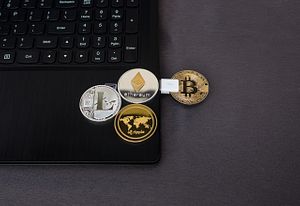In April, Koryo Tours, a travel agency specializing in North Korea tours, said on its website that North Korea had introduced a new cryptocurrency and dubbed “Koryo Coin.” The company said that the value of a coin is 8,888 North Korean won (1 U.S. dollar is approximately 890 North Korean won), and that tourists would be able to purchase goods in North Korea with the coin such as beer and ginseng.
Then, the agency reminded readers “to check the date of the press release.” It was April 1, or April Fool’s Day. The ‘announcement’ was a joke made by the company.
A cryptocurrency in North Korea, however, is more than a subject of a joke. According to a report by Korea Development Bank (KDB) Research Institute, North Korea is eagerly trying to develop cryptocurrencies, and transactions of such currencies are already taking place, although the usage is minimal.
Kim Min-gwan, a senior researcher at the Institute, says in the report that North Korea is also attempting to mine cryptocurrencies. Their characteristics, such as high anonymity, difficulty in tracking funds, and easy cash flow, provide the background for Pyongyang’s interest.
In particular, North Korea is strongly interested in mining Monetha coin. This is because mining Monetha does not require high-end computer equipment as other cryptocurrencies usually do, Kim notes. Kim cites North Korea’s attempt to mine cryptocurrencies in bulk between May and July last year as an example, adding it is understood the attempt was not that successful.
There have also been multiple reports suggesting that North Korea is attempting to hack cryptocurrency exchanges in South Korea.
In June, for instance, South Korea’s largest cryptocurrency exchange, Bithumb, was hacked, and about 35 billion South Korean won ($31.5 million) was stolen. At that time, Seoul-based newspaper Security News pointed out that a North Korean hacking group, Lazarus Group, may be behind the cyberattack.
The paper quoted multiple cybersecurity experts as saying that it was understood the hacking was initiated by a file with the “HWP” filename extension, which is widely used in South Korea. HWP files use Hangul, a program similar to Microsoft Word.
Security News added that Lazarus Group had already attempted to hack South Korean cryptocurrency exchanges early this year by distributing HWP files. At that time, the file was sent by many different domains, but all the domains were registered under one phone number.
This was one among many hacking attempts on South Korean cryptocurrency exchanges in which North Korea is believed to have been involved.
Meanwhile, transactions of cryptocurrencies are already taking place in North Korea, although on a very limited scale, according to Kim at KDB Research Institute.
Kim cites an American tourist who visited Pyongyang in January 2014. The tourist claimed at that time to have succeeded in sending money via a North Korean wireless network by using his Bitcoin.
In addition, according to “Coin-Map,” which collects and discloses where Bitcoin is used, there are four restaurants in Pyongyang and one in the city of Wonsan that take Bitcoin.
However, Kim is skeptical whether cryptocurrencies can be more widely used among the ordinary pubic across the country.
“There are many obstacles for cryptocurrencies to be developed and more widely used in the North due to lack of electricity, personal computers, and the infrastructure for internet service,” says Kim.
He adds that it is hard to expect the development of cryptocurrencies, for which decentralization is important, considering that internet access in North Korea is limited to a small number of people.
The fact that cryptocurrencies are hardly known among North Korean defectors backs this up.
In an interview with the Institute, many defectors who recently escaped from North Korea responded that they had never heard of cryptocurrencies back in the North.
The report notes that students who participated in a lecture on blockchain technologies and cryptocurrencies at Pyongyang University of Science and Technology in November 2013 also has very limited knowledge on such currencies.
Nonetheless, Pyongyang still seems determined to pursue its cryptocurrency dream — at least based on the latest announcement about a blockchain conference in Pyongyang.
According to a pro-North Korea group, the Korean Friendship Association, North Korea is to hold an international conference in Pyongyang to discuss blockchain technologies and cryptocurrency.
“From Sept 27th to Oct 4th, Pyongyang will host its first Korean International Blockchain Conference in collaboration with renowned foundations and experts in this technology,” the association said on its website. The website introduced Christopher Emms as one of the speakers for the conference while saying other speakers will be announced “soon.”
The program, along with the blockchain conference, is accessible for all citizens except those who hold passports from Israel, Japan and South Korea, the website noted.
Experts believe that such an international event would not be held in Pyongyang without the approval of North Korean leader Kim Jong Un.
This indicates that Kim and the North Korean authorities are strongly interested in blockchain technologies and cryptocurrency, and North Korea hopes to learn the latest industry trends and advance its capabilities.

































